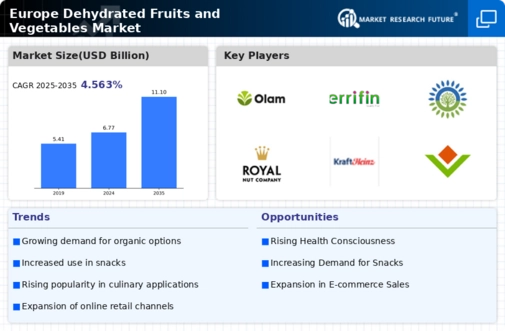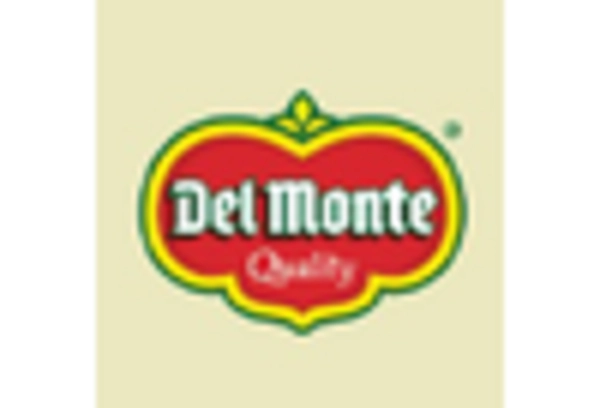Expansion of E-commerce Platforms
The dehydrated fruits-vegetables market in Europe is witnessing a transformative shift due to the expansion of e-commerce platforms. Online shopping has become increasingly popular, providing consumers with easy access to a wide variety of dehydrated products. This trend is supported by data showing that online sales of food products have increased by 25% in the past year. E-commerce allows for greater product visibility and convenience, enabling consumers to explore and purchase dehydrated fruits and vegetables from the comfort of their homes. As a result, the dehydrated fruits-vegetables market is likely to see continued growth as more consumers turn to online channels for their food purchases.
Rising Demand for Convenient Snacks
The dehydrated fruits-vegetables market in Europe experiences a notable surge in demand for convenient snack options. As lifestyles become increasingly fast-paced, consumers seek on-the-go food solutions that require minimal preparation. Dehydrated fruits and vegetables serve as ideal snacks, offering portability and extended shelf life. Recent data indicates that the market for dehydrated snacks has grown by approximately 15% annually, reflecting a shift in consumer preferences towards healthier, ready-to-eat options. This trend is particularly pronounced among younger demographics, who prioritize convenience without compromising nutritional value. The dehydrated fruits-vegetables market is thus positioned to capitalize on this growing demand, as manufacturers innovate to create diverse and appealing snack products.
Focus on Food Preservation Techniques
The dehydrated fruits-vegetables market in Europe is significantly impacted by advancements in food preservation techniques. As consumers become more aware of food waste and its environmental implications, the demand for preservation methods that extend shelf life has increased. Dehydration is recognized as an effective technique for preserving the nutritional quality of fruits and vegetables while reducing spoilage. Recent studies indicate that food preservation methods, including dehydration, can reduce waste by up to 30%. This growing focus on sustainability and waste reduction drives interest in the dehydrated fruits-vegetables market, as consumers seek products that align with their values and contribute to a more sustainable food system.
Growing Interest in Plant-Based Diets
The dehydrated fruits-vegetables market in Europe is positively influenced by the rising interest in plant-based diets. As more individuals adopt vegetarian and vegan lifestyles, the demand for plant-based food options, including dehydrated fruits and vegetables, has surged. This shift is reflected in market data, which indicates that plant-based food sales have increased by 20% over the last year. Dehydrated products offer a versatile and nutritious solution for those seeking to incorporate more plant-based ingredients into their meals. Consequently, the dehydrated fruits-vegetables market is well-positioned to cater to this expanding consumer segment, as brands develop innovative products that align with plant-based dietary preferences.
Increased Awareness of Nutritional Benefits
The dehydrated fruits-vegetables market in Europe benefits from a growing awareness among consumers regarding the nutritional advantages of dehydrated products. Research suggests that dehydrated fruits and vegetables retain a significant portion of their vitamins and minerals, making them a valuable addition to diets. As health-conscious consumers seek to enhance their nutritional intake, the demand for these products has risen. In fact, a recent survey indicated that 70% of consumers consider the health benefits of dehydrated foods when making purchasing decisions. This heightened awareness drives growth in the dehydrated fruits-vegetables market, as brands emphasize the health attributes of their offerings to attract a more informed consumer base.

















